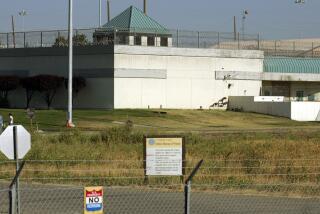C. A. Smith Leaving Jail After Serving Eight Months
C. Arnholt Smith, the former financier and presidential confidant convicted of stealing $8.9 million from one of his companies, is to be released from a San Diego County jail Sunday after serving less than eight months of his one-year sentence.
Smith, who is 86, has spent most of his time tending rose bushes and mowing lawns at a minimum-security center used mainly for men convicted of drunken driving. His good behavior is credited for his sentence being cut by more than a third.
“He’s done an excellent job,” Vicki Markey, deputy chief of the county Probation Department, said Monday. “He’s probably been one of the best gardeners we’ve ever had down there. He’s a very hard-working fellow.”
Once one of San Diego’s most powerful men, Smith ran a billion-dollar business empire that included the San Diego Padres baseball club, the Yellow Cab Company of San Diego and the now-bankrupt U.S. National Bank.
He was named “Mr. San Diego” in 1966 and was one of Richard M. Nixon’s close friends.
But in 1979, he was convicted of one count of felony grand theft for stealing $8.9 million from his securities company, Sovereign State Capital. He also was convicted of four felony tax fraud charges, later reduced to misdemeanors.
Initially, a judge sentenced Smith to three years on an honor farm and five years’ probation. But he remained freed as he staged various appeals for five years, during which his sentence was cut to 365 days. On Nov. 26, Smith surrendered at the downtown jail. He served 42 days there, then was transferred to the Work Furlough Center at 35th Street and Ocean View Boulevard.
Smith is now scheduled for release Sunday, said Ron Barkett, the director of the center. Barkett said he could not say precisely when Smith would leave. “There’s no fanfare,” he said Monday. “They just give them their stuff and they go.”
Smith’s sentence was cut by a third because he has broken none of the center’s 26 rules of conduct, Barkett said. Those rules bar such things as assaulting other inmates, sloughing off work and smoking in bed.
Smith also will receive “the five-day kick”--an additional reduction that the state allows for model inmates in overcrowded facilities. Markey said there are 300 convicted offenders on the waiting list for the center, the only work-furlough facility in the county.
Most of the 120 or so inmates are men serving sentences for multiple convictions for drunken driving. Most work their normal jobs in the community, returning to the center only to sleep. But a small percentage, like Smith, are assigned there because their health is fragile. The center is near hospitals and the county’s honor camps, where Smith might have been sent, are more isolated.
Smith worked as a gardener--pruning and watering about 60 rose bushes, and watering, mowing and fertilizing the lawns, Markey said. “He has a couple of other gentlemen, I believe, who work with him,” she said.
Markey said most of the inmates in the center, like Smith, receive the maximum sentence reduction. Barkett said he could not remember ever having an inmate as old as Smith. He said he could not talk about Smith’s health.
Smith’s attorney, Peter Benzian, also declined to discuss Smith’s eight-month jail stay, saying Smith would be the best one to talk about it. He said he would ask Smith to return a reporter’s call, but Smith did not telephone Monday.
Thomas McArdle of the San Diego County district attorney’s office, which prosecuted Smith, said his office has no say in Smith’s release. He refused to comment on the fairness of the time served.
But he pointed out that his office had argued that Smith should serve as much as 10 years in state prison. Later, after a judge cut Smith’s original three-year sentence to one, the office argued that that was too little.
“We thought what we argued for in the first instance was fair--a just and appropriate sentence. And we didn’t get it,” said McArdle, acting chief of the appellate division. “So you can take any conclusion from that you want.”
More to Read
Sign up for Essential California
The most important California stories and recommendations in your inbox every morning.
You may occasionally receive promotional content from the Los Angeles Times.










